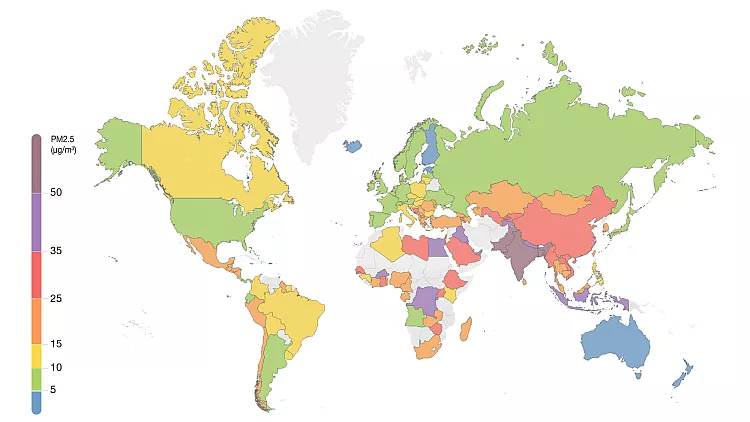According to the latest findings from the World Air Quality Report by Swiss air quality technology company IQAir, a mere seven countries worldwide managed to meet safe air pollution standards in 2023.
The comprehensive report draws upon data collected from over 30,000 monitoring stations across 134 countries, territories and regions, offering a sobering insight into the scale of the crisis. Alarmingly, a staggering 124 of these regions were found to exceed safe levels of PM2.5 fine particulate matter notorious for its detrimental health effects.
PM2.5 particles, measuring less than 2.5 microns in diameter, pose severe health risks as they can penetrate deep into the lungs and bloodstream, leading to a myriad of health complications including heart and lung disease, hypertension, asthma exacerbation, mental health issues, and premature mortality.
Among the very few nations meeting safe air quality guidelines were Australia, Estonia, Finland, Grenada, Iceland, Mauritius and New Zealand. Additional regions such as Puerto Rico, Bermuda, and French Polynesia also fell within acceptable thresholds.
Europe showcased a mixed performance, with Iceland leading the pack, boasting the cleanest air with a PM2.5 level of 4µg/m3, followed closely by Estonia and Finland. However, a colour-coded assessment of pollution levels across European countries revealed a concerning trend, with several nations surpassing safe standards.

While notable progress has been made, particularly in Croatia, challenges persist in curbing pollution levels across the continent. The report highlighted Bosnia and Herzegovina and North Macedonia as among the most polluted countries in Europe, underscoring the urgent need for comprehensive strategies to tackle air pollution.
In the global arena, South and Central Asia emerged as epicentres of pollution, with Bangladesh, Pakistan, India, Tajikistan, and Burkina Faso ranking among the worst-affected nations. These regions, home to the world's most polluted cities, grapple with PM2.5 levels far exceeding safe limits, exacerbating public health concerns.
As the report sheds light on the severity of the crisis, there are immediate calls for action. Efforts to address air quality disparities, expand monitoring networks, and implement sustainable solutions have never been more critical. With lives at stake, the imperative to combat air pollution looms large on the global agenda, demanding concerted action and unwavering commitment from leaders and communities worldwide.
(Source: Euronews)


